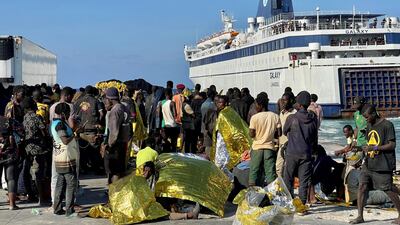Germany withdrew from a European voluntary solidarity scheme on Wednesday under which it takes in migrants from Italy, in what could become a new stand-off over asylum seekers in the bloc.
The EU-wide scheme is aimed at easing pressure on member order nations that are often the first port of call for migrants.
Germany was due to receive 3,500 asylum seekers who had first sought refuge in Italy. But only 1,700 arrived before Berlin decided to pause the intake.
"Given the currently high migratory pressure on Germany, the ongoing suspension of Dublin transfers by some member states, including Italy, reinforces the major challenges Germany is currently facing in terms of its reception and accommodation capacity," a spokesman for the Interior Ministry said.
As a result, Berlin told Italy of its decision to "postpone until further notice" its intake of migrants.
Under the so-called Dublin procedure, irregular migrants should be registered in the EU country they first enter. Should they head to another nation in the bloc, they could be returned to their EU first port of call.
But Mediterranean countries such as Italy say the rules place an excessive burden on border nations, particularly since new arrivals often want to move on and live in other EU countries.
Italy migrant boat tragedy - in pictures
Germany took in more than a million asylum seekers, mainly from Syria and Iraq, between 2015 and 2016 before the arrival numbers began falling sharply.
But over the past year, authorities have recorded a surge in arrivals again.
The latest numbers provided by federal police show 15,100 irregular migrants arriving in August, up 40 per cent from July's 10,714.
Italian Prime Minister Giorgia Meloni, whose far-right party won elections a year ago on a promise to stop mass migration, said on Wednesday that she was not surprised by Berlin's decision.
Her government temporarily suspended the Dublin rules in December for "purely technical reasons" linked to overworked reception centres, known as hotspots.
"The issue of relocation is secondary," Ms Meloni said in an interview to be broadcast later Wednesday.
"The question … is stopping arrivals into Italy. I still don't see any concrete answers."
She repeated her call for more EU help, adding: "Our hotspots are full."
The number of migrants arriving in Italy after crossing on boats from North Africa has surged this year, at almost 124,000 since January, up from 65,500 during the same period in 2022, according to government data.
Many land on the island of Lampedusa, where the reception centre on Wednesday warned it was reaching critical capacity.
The Italian Red Cross, which has run the hotspot since June, said more than 100 landings within a few hours left it hosting more than 6,000 people in a centre built for fewer than 400.
"The situation is difficult," the charity said.










